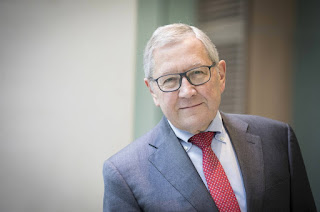The Third Max Watson Memorial Lecture
Klaus Regling
Managing Director of the European Stability Mechanism
Regling made a persuasive case that unalloyed global dependence on the dollar left the world unduly vulnerable to US monetary policy and domestic developments, as seen in the Latin American crisis, Asian crisis, and global financial crisis. A wider international role for the euro would strengthen global financial stability, as well as supporting growth and integration within Europe.
Regling explained that he envisages not a dual dollar/euro system, but a multi-polar system—since China also has begun to prioritize greater global influence of the renminbi. Multi-polarity in itself would have benefits for global financial stability, by offering possibilities for diversification and hedging. But in such a world, Europe would offer additional advantages of trust and credibility, which should help its currency stay a strong second global currency. Besides Europe’s economic size, it offers a credible legal system, with stable rule of law and investor protection. It has an independent central bank, and operates advanced, open financial markets.
Europe’s comprehensive response to its crisis restored and further strengthened the influence of the euro. The response included large EFSF/ESM financial support to safeguard stability in euro area countries which could not use the exchange rate instrument, as well as banking, fiscal, and structural reforms, and closer policy coordination. Happily, it is clear that Europe’s stability is now more assured. For instance, banks have slowly worked their way through the Non-Performing-Loans legacy of the 2010-11 crisis, and have been a stabilizing factor rather than a vulnerability during covid.By now, the euro and the dollar share trade invoicing and payments more or less equally, but the dollar remains dominant in foreign exchange trading, official reserves, safe assets, debt and equity markets. Europe’s continued heavy dependence on long-term bank financing and fragmented national capital markets are drags on growth and on expansion of the international use of the euro. European safe assets—even after bond issue to finance Next Generation EU funds (NGEU)—will remain below 40 percent of area GDP, compared with 90 percent in the US.
Key requirements for the use of the euro to expand further are stable and liquid financial markets, and a strong domestic economy. The introduction of NGEU recovery funds, with intra-regional transfers coupled with structural reforms, are a significant leap forward. With a potential EU 850 billion NGEU debt issue by 2026, the EU will become one of the largest issuers in the euro area. Taken together with other sovereign and AA+ debt, this could imply safe assets of around EU2 trillion in Europe—offering diversification to dilute the unhealthy sovereign-/banking-sector dependence. There is already evidence of massive excess demand for EU debt issue.
Nonetheless, the euro area needs still more economic risk-sharing, through both market and government channels.
Nonetheless, the euro area needs still more economic risk-sharing, through both market and government channels.
On the market side, banking union and a single market for financial services (capital markets union) would allow capital to be used more efficiently, thereby bolstering Europe’s competitiveness and growth potential. For both banking and capital markets union, however, the next steps will require difficult political decisions:
- Banking union will require a European deposit insurance scheme, cross-border integration, and diversification of bank balance sheets. An important next step already underway is the ratification of the ESM backstop for the Single Resolution Fund, by January 2022.
- Capital markets union will require at least partial harmonization of the 19 national capital markets’ rules and laws. Notably, they need partial harmonization of their national insolvency laws, a common corporate tax base, and further supervisory convergence.
- The EU budget already provides a certain amount of risk-sharing, as do the loans from the European Investment Bank and financial assistance from the ESM—and now the NGEU. But these cover the EU as a whole, not just the euro area with its potentially greater stabilization needs in the absence of exchange rate adjustment. Moreover, the NGEU is time-limited.
- Hence, national budget buffers could usefully be supplemented by a central fiscal capacity (CFC). The CFC would complement national fiscal space, without being an annual budget or requiring transfers. Instead, a revolving fund could be created, for activation only when necessary. The ESM could create and manage such a fund.
Regling concluded by reminding a receptive audience that a stronger euro underpinned by banking union, capital markets union, and more public risk-sharing would be advantageous not only for Europe but for the international financial system as a whole.
Adrienne Cheasty (Academic Visitor, St Antony's College, Oxford)
Adrienne Cheasty (Academic Visitor, St Antony's College, Oxford)

No comments:
Post a Comment